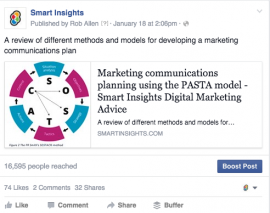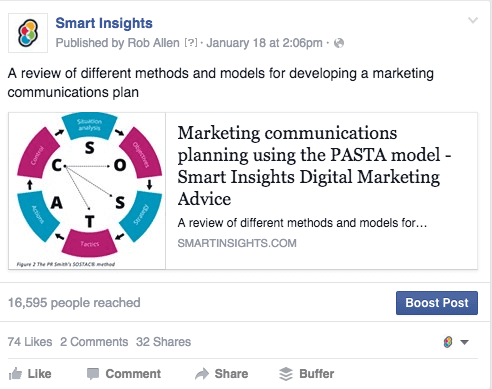Facebook to clamp down on clickbait?! [@SmartInsights Alert]


Facebook will decide which stories are relevant and so have a greater organic reach based on qualitative user feedback as well as post engagement
Importance: (For Facebook marketers)
Recommended Source: Facebook Newsroom – useing qualitative feedback to show relevant stories
Online marketers are often butting their heads against Facebook’s organic reach. If you can get a post to get a great number of likes quickly then it can snowball and get seen by thousands. But, if it flops and fails to get engagement in those crucial first moments, then it is quickly chocked off by Facebook’s Page reach algorithm it will only be seen by a tiny fraction of the people who like your page. For example, it’s fairly standard for a Smart Insights post to reach 5,000 of the 50,000 people who Like our page. A good update like that below might reach 10,000 or 20,000 but a real flop might reach as few as 800. In short, being on the good or bad side of Facebook’s reach algorithm is incredibly important, and is one of the most important determinants of social media success.
That’s why marketers have played a lot of attention to any changes in the Facebook reach algorithm, as a big change to how it is calculated obviously will have major ramifications for their marketing efforts.
Previously the algorithm has worked by serving posts to people based on the amount of engagement they get in terms of likes, comments and shares. A new announcement from Facebook on the 1st of Feb has made it clear this is set to change, with user ratings playing a more important role.
Facebook say they ask tens of thousands of people every day to rate posts in their newsfeed based on the question: ‘How much did you want to see this story in your News Feed?’. This data will be used in future to determine how often content appears in peoples’ newsfeed. It doesn’t mean likes comments and shares will be irrelevant, they will remain an important factor in determining the organic reach of a post. However this feedback from Facebook members will also be taken into account to predict the likelihood of people wanting to see a given post.
Why are Facebook doing this?
Facebook haven’t been explicit in their motives for making the change, they just say that it will help them deliver posts that are more meaningful to their members. But it is relatively clear that the changes are an effective way to beat ‘click bait’ type content and help higher quality content pull ahead of the pack.
The easiest way to explain why this change will achieve these goals is by a simple example.
Page A tries to get the maximum possible engagement on its posts to boost their organic reach, and will use any method to do so. Page A posts content designed to draw clicks without actually giving value, such as ‘This girl didn’t see that Spider coming. You won’t believe what happens next!’. The post might get a lot of clicks but the link actually points to some thin and uninteresting content that isn’t what was promised. It thus has a high bounce rate and leaves its viewers dissatisfied. We all see click-bait type posts every day; they are all too familiar at the bottom of media sites…
Page B links to its well-written blog on fashion tips. When page B posts it tends to be giving fashion tips or linking to its blog. Its posts aren’t spammy and aren’t constantly commanding its audience to ‘Click here’. Its posts leave its members satisfied that they got what they wanted from the page, however it gets less clicks than page A because it isn’t drawing as many clicks as possible via spammy tactics.
Under the old system Page A might receive a better page reach because Facebook doesn’t know its annoying most of the people that see its posts. However with the new system this feedback can be taken into account and Page A will see its reach decline whilst Page B should see a boost.
Its worth nothing that Facebook don’t expect this change to make a huge different to reach initially. They say that pages might see some declines in referral traffic if the rate at which their stories are clicked on does not match how much people report wanting to see those stories near the top of their News Feed.
The Facebook advice for avoiding being penalized by the change is quite simple and logical:
“Pages should avoid encouraging people to take an action (such as encouraging lots of clicks), because this will likely only cause temporary spikes in metrics that might then be rebalanced by feed’s ranking over time.”
Stay tuned for updates on this on-going change to Facebook’s Newsfeed, and let us know if you’ve seen any positive or negative changes in your page’s reach. For most Facebook marketers (and Facebook users) this change should be good news. If you’ve been engaging in click bait type practices however, you may need to review your practices.
From our sponsors: Facebook to clamp down on clickbait?! [@SmartInsights Alert]



